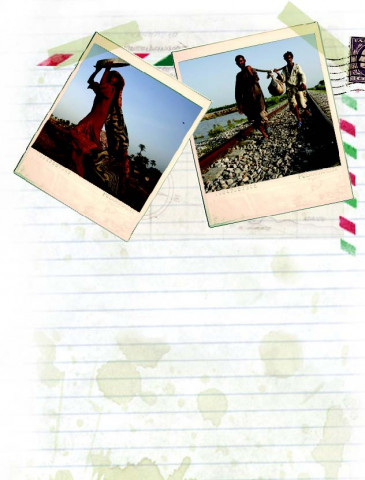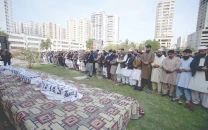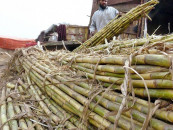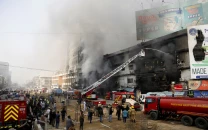‘We just want to go home’
Almost a month into the floods, survivors in Sindh are aching to go back to their homes.

Mir Muhammad saw the disaster wreaked by the floods up close. He was there when the Tori Bund broke and poured out gallons of river water that rushed towards settlements, submerging all that came in its path.
According to him, it did not take days or even hours for the Tori embankment to break. Everything happened within seconds and after the breach in this embankment, four other important embankments crumbled like sand in front of the raging river.
Several days after the catastrophe, Mir Muhammad just wants to go home. He is waiting for the massive breach in Tori Bund to be repaired so he can go back and start his life anew.
The breach in Tori Bund inundated nearly 300 villages in Kandhkot tehsil alone. Thousands of people were forced to leave their homes, however most of them did not go very far.
Camped out just next to the damaged embankment, Muhammad is there with around 40 of his relatives and nearly 300 other residents of Darani Mahar village.
Many of them saw the embankment break.
“When the breach occurred, all the army jawans and the irrigation staff just ran,” recalls resident Muhammad Bachal, “We were left all alone to grab our families and whatever else we could and move to safer areas.”
Thousands of families like Bachal’s are scattered along the riverside near Tori Bund. They said that the government has provided them with nothing. Most of these families were able to salvage enough of their stored edibles to survive for a while.
But while they have food, the flood survivors desperately need medicines.
“Don’t give us food but our children are sick,” said a group of female survivors, “Our cattle are sick, we need medicines.”
Mir Muhammad’s female relatives too expressed a desire to just go back home. Spending Ramazan under the open sky was just too hard.
However, these families have a long wait ahead of them. According to Brigadier Amanat, repairs have begun at Tori Bund but the level of water is still too high. More than 50 feet of floodwater has inundated hundreds of villages, wiping them out of existence. Due to the water accumulation, the armed forces are facing a lot of trouble trying to get machines and required equipment to the spot.
“It takes at least two-and-a-half to three hours to get here by jeep,” said Brigadier Amanat, “This is how our plant equipment and stones from Rohri are getting here.” The forces also require mud in great quantities to fill the breach with. “We are trying our best to fill up the breach as soon as possible,” he added but refrained from giving a deadline.
Irrigation engineer Amjad Hussain Jatoi expressed similar views but he ventured to give a tentative timeline, “It will take at least another month to fill up the breach.” Rehabilitation of the affected families in these areas will take even longer, he added.
Mai Hayatan too was one of those who were caught off guard by the momentum and sheer force of the flood. She had no time to save anything but her life. “We have nothing left, we had so much land and we had stored grass and food,” she lamented, “Where are we to go now?”
Desperation in Larkana
Abdul Karim Lashari might have been able to save his family from immediate devastation by the floods but he was unable to help his two-year-old daughter, Jamal, who succumbed to disease after the floods.
The family left Garhi Khairo and came to Larkana for refuge. They are settled at the relief camp near the railway station.
“I brought my daughter to this camp, asking them to take her to the hospital but they refused,” said the worn-out looking Lashari.
There are nearly 100,000 flood survivors like Lashari, who are camped out in Larkana in around 300 camps put up across the district. Camp, however, is a relative term for in many of these cases, families do not even have shelter over their heads. Food, drinking water and medicines continue to be a perpetual, pressing need for these people.
“I ask the government to come here and just kill us and our children, there is no comfort, no peace here,” said a distraught resident of Qabu Saeed Khan, Soomro Magsi, “This [our miserable condition] is sheer torture.”
But the torture is not limited to the flood survivors. The entire district and its administration is trembling under the burden. “All schools have been turned into relief camps, there is so much pressure on Larkana right now,” said Syed Hasan Naqvi, Larkana DCO, “We have very limited resources but we are still trying to look after the flood survivors.”
with additional reporting by Shiraz Pathan
Published in The Express Tribune, September 3rd, 2010.



















COMMENTS
Comments are moderated and generally will be posted if they are on-topic and not abusive.
For more information, please see our Comments FAQ